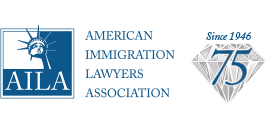 Today, the American Immigration Lawyers Association (“AILA”) and its litigation partners achieved a historic settlement with the Department of Homeland Security (“DHS”) in Shergill, et al. v. Mayorkas, Case 2:21-cv-01296, 9/23/21 in the U.S. District Court for the Western District of Washington.
Today, the American Immigration Lawyers Association (“AILA”) and its litigation partners achieved a historic settlement with the Department of Homeland Security (“DHS”) in Shergill, et al. v. Mayorkas, Case 2:21-cv-01296, 9/23/21 in the U.S. District Court for the Western District of Washington.
In Shergill, AILA brought a class action lawsuit on behalf of H-4 and L-2 spouse who had applied for work authorization as the dependents of H-1B and L-1 principal visa holders, but had faced processing delays, forcing them out of employment and creating gaps in work authorization.
The parties’ settlement reverses a U.S. Citizenship and Immigration Services (“USCIS”) policy that prohibited H-4 spouses from obtaining automatic extensions of their employment authorization during the pendency of standalone employment authorization document (“EAD”) applications. The settlement represents a massive change in position by USCIS, which now recognizes that L-2 spouses enjoy automatic work authorization based upon their underlying status, meaning spouses of executives and managers will no longer have to apply for EADs prior to working in the United States.
Jon Wasden, one of AILA’s litigation partners, stated, “After years of outreach to [USCIS], it became clear that litigation was unfortunately necessary. Despite the plain statutory language, USCIS failed to grant employment authorization incident to status for L-2s. The other issue relates to H-4s whose work permits expire prior to their H-4 status; this is a group that always met the regulatory test for automatic extension of EADs, but the agency previously prohibited them from that benefit and forced them to wait for reauthorization. People were suffering. They were losing their high-paying jobs for absolutely no legitimate reason causing harm to them and U.S. businesses. So, while I’m glad the agency finally followed the law, it is frankly frustrating that an easily fixable issue took this long to address.”
The settlement should ultimately make it easier for dependent H-4 and L-2 spouses to focus on their careers and obtain gainful employment in the United States, rather than worrying about gaps or delays in their work authorization status.
For additional information, contact Mechelle Zarou at mzarou@shumaker.com; Maria del Carmen Ramos at mramos@shumaker.com; or Ali Latif at alatif@shumaker.com.
